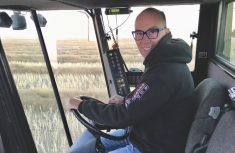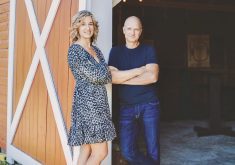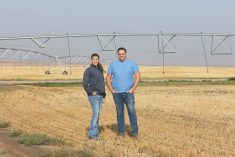How serious are Barrie and Merel Voth about their start-up goat dairy venture? Serious enough that they wrote exactly two exit options into their farm lease agreement. Bankruptcy. Or death.
“Oh, but don’t write that!” says Merel.
In April last year, when they signed on the dotted line for their five-year lease agreement at Silver Creek, between Vernon and Salmon Arm, B.C., they tied themselves — and their landlords — as tightly as legally possible to the contract. And no wonder: Hillside Dreams Goat Dairy represents more than a 12-hour-a-day job, and more than every nickel of their savings. This start-up farm is the culmination of 16 years of Barrie’s dreaming and scheming, apprenticing and planning.
Read Also

Outstanding Manitoba farm couple harnesses innovation and data
For over a decade Paige and Marcus Dueck have embraced their passion for farming while striving to innovate and expand…
Admittedly, the Voths’ farming venture might not be everyone’s cup of tea. Even by agriculture’s fairly extreme standards, the hours at Hillside Dreams are long, physically demanding and labour intensive. But both Merel and Barrie agree: the joy found building this dream, the family time it affords, and the opportunity to work the land together make it worth all that effort and more.
The alarm clock rings at 3:30 a.m., seven days a week, 365 days a year. With more than 300 not-so-patient four-leggers in the barns across the laneway, hitting snooze isn’t even a possibility.
By 3:45 a.m., Barrie is forking hay, pouring grain, checking mamas, moving newborns, mixing bucket after bucket of formula. An hour later, he pulls a lever, making the gates of his high-tech milking parlour whoosh open. With surprising orderliness, the first of 145 full-uddered milking goats separate themselves from a milling, maa-ing flock and slot themselves into milking position, ready to contribute their share towards the 250 litres Barrie collects at each milking time.
Though the incredibly early morning start can be tough, especially in the dark and cold of winter, the early hours allow intentional family downtime once the earliest chores are done. Finding balance, especially because they are proud parents to six-month-old baby Mattias, is a top priority.
“One of the best parts of farming is that we always have a fancy breakfast. That’s when we spend quality family time together, just hanging out between 7 a.m. and 9 a.m., doing some devotions, and taking Mattias for a walk,” says Barrie.
Granted, by breakfast Barrie will already be four hours into his work day. By many people’s standards, that many hours of hard labour would equal a workday half done. Not on this farm. After breakfast and family time, Barrie will still have another eight or more hours of barn-time to go before he tucks his four-legged ladies in for the night. And with baby Mattias strapped to her back for many of those hours, Merel will work right alongside.
Barrie has dairy farming in his blood but, because his dad gave up a (cow) dairy quota when he was two, Barrie can’t claim being born and raised in farming. Still, there’s little question that every part of him was born to be a farmer.
At 16, he got his first goats. By 22, he’d bought his first farm house, started breeding goats, and was already six years into a 16-year, self-made apprenticeship at cow and then goat dairies. Now, at 32, he’s weeks away from celebrating a huge milestone: the one-year anniversary of officially rolling their very own goat dairy into production.
“We realised we could afford to buy a farm or start a farm, not both. We could afford land but then we’d have no animals because land is so expensive. So, we decided to hold off on buying our own place for another five to 10 years and instead we went in search of a place we could rent,” says Merel.
Finding a suitable place with the right kind of space and buildings, acceptable on-site accommodations, and reasonable proximity to the processing plant that buys their milk was a longshot.
“I drove around all these little farm roads, knocking on doors at any places that looked like they could maybe suit us. I knocked on a lot of doors. In January, I drove by this place. It had the barns and, by chance, it had been a cow dairy until just three or four months before, so the place had potential,” says Barrie.
“Perfect!” I say. “Almost like it was meant to be?”
“Oh, so, so not perfect,” counters Merel.
The house needed serious work to be liveable; the barns needed even more. And so, in the midst of Merel’s last trimester of pregnancy, her last weeks of thesis completion towards a masters degree in social work, and the 14-, 16-, even 18-hour days of grinding, sawing, chiseling, and constructing to convert a former cow dairy into a goat-appropriate operation, Merel and Barrie lived in an RV. A rough RV. A rough RV with a leak in the roof right above their bed.
“It gave us a true appreciation for a flush toilet, a kitchen and a full-size bed with headroom,” says Merel. “It was a strength-building exercise for our marriage.”
And that’s just the start. In fact, if adversity builds strength, Barrie and Merel must sport some very big muscles. On their first goat-buying trip east, they managed -35 C temperatures only to have their truck break down, leaving them wondering whether it was meant to be, says Merel.
Delivery of the high-tech milking equipment, ordered directly from Holland, was delayed and then delayed again resulting in Barrie hand-milking, up to 40 milking does (nanny goats) four hours per day for weeks.
The hottest days of the summer fell on “goat moving day”: Merel and Barrie managed to corral, load, and truck 180 worried goats, 40 goats at a time, the 50 km from their old farm (now sold to finance the business startup) to the new farm.
“I never had postpartum depression but I probably had some form of post-farm-starting depression. You just can’t catch a break some days,” says Merel.
That said, much more important to the Voths than the hard times and learning experiences have been the wins and many successes even in just this first year of operation.
“So far, I think we’ve been pretty lucky and we’ve made a lot of good decisions,” says Barrie. “Ask us in five years what we’d do different because we’re still in too much startup mode to be able to answer that now. But overall, I’m happy with the choices we’ve made along the way.”
Partially, that’s because the Voths know how to ask good questions of people who can provide good answers.
“It’s great to have a dream and a vision but you need certain people on your team: people to help us be realistic, like a great landlord, a mentor, a lawyer, an accountant, a good feed rep, a good vet. That way, it’s not just us on our own, and our decisions can be grounded in good economics, not just a love for goats,” says Barrie.
In the midst of farm startup last year, Barrie competed in a program called Launch-a-preneur, a competition supported by Okanagan University College, the Shuswap Community Futures, and his town’s economic development society. The competition is exactly what it sounds like: a takeoff on popular TV show “The Dragon’s Den.” The competition strives to support and help establish innovative, local, brand-new entrepreneurs. The competition connected Merel and Barrie with a business mentor who has since become an invaluable resource.
“You can say you want to milk this many goats, but how much does it cost to keep each goat per day? Where is that going to take us in five years? That’s what our business mentor helps us with. She’s crazy about numbers, but in such a good way,” says Barrie. “We want to grow — I’m hoping to be milking 250 goats by the fall next year — but we need to be growing using good economics.”
One person who hopes to take a slightly more backseat role on the farm is Merel. When her maternity leave is over in November, she plans to return to full-time social work at the local hospital. By then, they hope to have hired a part-time employee for the farm. But for now, Merel is a hands-on, heart-in part of this team, moving goats, cleaning machines, lugging pails of milk replacer formula to hungry goat kids.
“The reality is, I’ve never wanted to be a farmer’s wife. That was never the dream,” she says with disarming honesty. “There are a lot of ways to support this farm’s success. For now, that means I’m here; later it’ll mean I’m contributing to keeping us going by going back to off-farm work.”
Back in July last year, B.C.’s Agriculture Minister Norm Letnick went for a drive along a quiet country road, looking to chat with a farmer or two along his meandering way. By chance, he pulled over beside a faded red, quintessentially “farmy” barn, deceptively quiet in the mid-morning sun. There, he met a couple who in words and work ethic prove that agriculture has a bright future.
“He wanted to talk farming: to hear about what we’re doing and to find out about our plans for the future,” Barrie says. “We told him we’re planning to be in this for the long haul, one April kidding season at a time.”


















